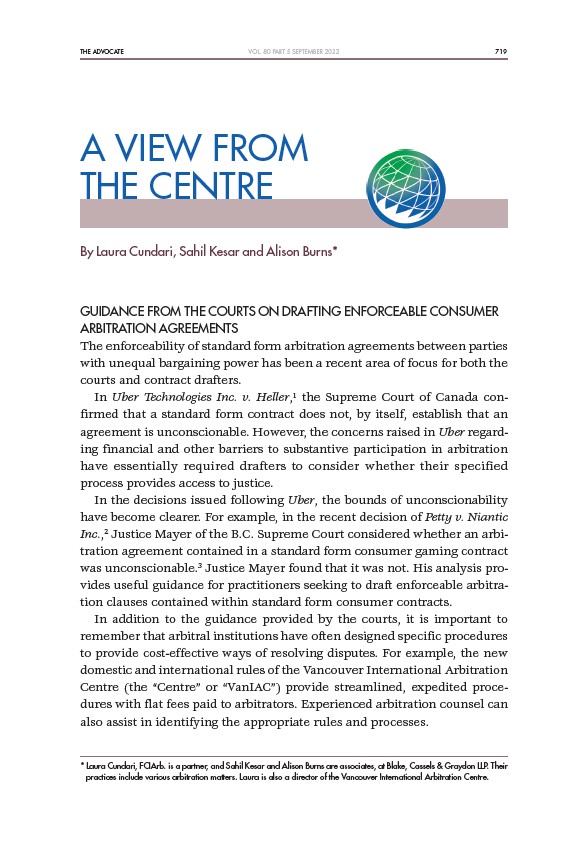
THE ADVOCATE 719
VOL. 80 PART 5 SEPTEMBER 2022
A VIEW FROM
THE CENTRE
By Laura Cundari, Sahil Kesar and Alison Burns*
GUIDANCE FROM THE COURTS ON DRAFTING ENFORCEABLE CONSUMER
ARBITRATION AGREEMENTS
The enforceability of standard form arbitration agreements between parties
with unequal bargaining power has been a recent area of focus for both the
courts and contract drafters.
In Uber Technologies Inc. v. Heller,1 the Supreme Court of Canada confirmed
that a standard form contract does not, by itself, establish that an
agreement is unconscionable. However, the concerns raised in Uber regarding
financial and other barriers to substantive participation in arbitration
have essentially required drafters to consider whether their specified
process provides access to justice.
In the decisions issued following Uber, the bounds of unconscionability
have become clearer. For example, in the recent decision of Petty v. Niantic
Inc.,2 Justice Mayer of the B.C. Supreme Court considered whether an arbitration
agreement contained in a standard form consumer gaming contract
was unconscionable.3 Justice Mayer found that it was not. His analysis provides
useful guidance for practitioners seeking to draft enforceable arbitration
clauses contained within standard form consumer contracts.
In addition to the guidance provided by the courts, it is important to
remember that arbitral institutions have often designed specific procedures
to provide cost-effective ways of resolving disputes. For example, the new
domestic and international rules of the Vancouver International Arbitration
Centre (the “Centre” or “VanIAC”) provide streamlined, expedited procedures
with flat fees paid to arbitrators. Experienced arbitration counsel can
also assist in identifying the appropriate rules and processes.
* Laura Cundari, FCIArb. is a partner, and Sahil Kesar and Alison Burns are associates, at Blake, Cassels & Graydon LLP. Their
practices include various arbitration matters. Laura is also a director of the Vancouver International Arbitration Centre.